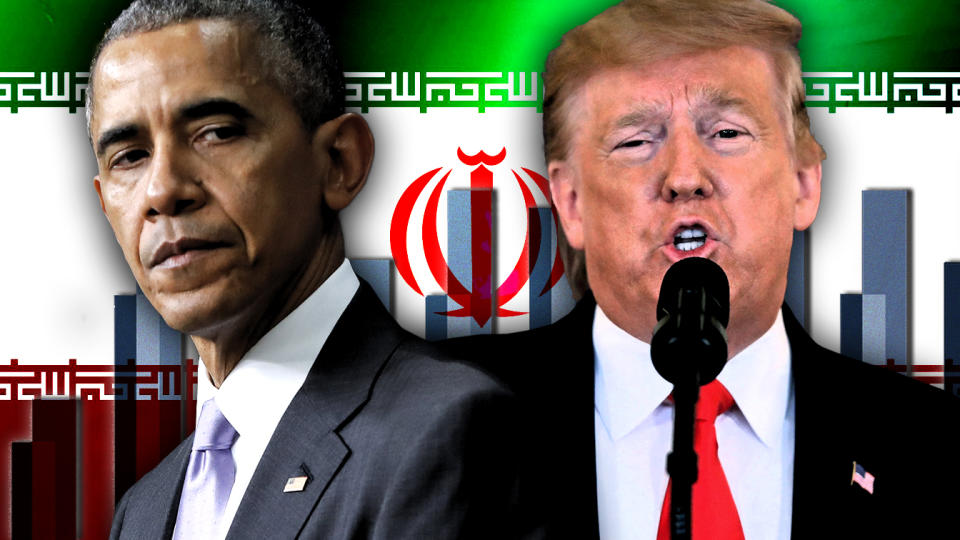New Yahoo News/YouGov poll shows Americans view Obama as 'more effective' than Trump on Iran
- Oops!Something went wrong.Please try again later.
According to a new Yahoo News/YouGov poll, Americans are evenly divided over President Trump’s decision to kill Iranian military leader Qassem Soleimani, but a plurality of the public opposes Trump’s overall approach to the Islamic Republic and believes his Democratic predecessor Barack Obama was more effective in dealing with Tehran.

Conducted from Jan. 8 to 10 — after Iranian ballistic missiles struck Iraqi bases in retaliation without causing American casualties and Trump declared that “Iran appears to be standing down” — the poll found that 42 percent of Americans opposed Trump’s approach to Iran (versus 36 percent who supported it). Forty percent said Trump was wrong to withdraw from the Obama administration’s nuclear treaty with Tehran (versus 35 percent who said he was right), while 41 percent said Trump has been less effective on Iran than Obama (versus 34 percent who said the current president has been more effective). On all three questions, about a quarter of respondents said they were either not sure or neutral.

The percentage of the public (38 percent) that approved of Trump’s decision to kill Soleimani, which his campaign has been touting in fundraising emails and Facebook ads, is statistically indistinguishable from the percentage that disapproved (37 percent) — a divide that may stem from the fact that only a third of Americans believe the administration’s claim that Soleimani was planning an “imminent” attack on the U.S. (A slightly smaller proportion — 29 percent — disbelieved the claim; the rest were unsure.)
More Americans also said Trump’s handling of recent events in the Middle East made them less likely to support him in the 2020 election (35 percent) than said they were more likely to support him as a result (29 percent). A plurality (36 percent) said his approach would have no effect on their vote.
Not all of Trump’s actions toward Iran have been met with public disapproval or division. When asked whether the U.S. should take additional military action against Iran, 50 percent said no, including a wide majority of Democrats (70 percent) and a slight plurality of Republicans (37 percent); overall, only 20 percent of Americans said yes. When that decision was framed as Trump’s and respondents were asked whether they approved or disapproved of the president’s decision to impose more economic sanctions instead of further retaliating with force, Democratic support went down (to 58 percent) and Republican support went up (to 81 percent), but overall, a broad majority of Americans (63 percent) said they were in favor; only 14 percent disapproved. Despite the president’s polarizing effect, de-escalation with Iran is a popular position.

Respondents were also asked if they had high, medium or low confidence in how various 2020 candidates would deal with Iran. The results showed that while Trump scored poorly — 31 percent said “high,” compared with 52 percent who responded “low” — most of his potential Democratic rivals fared no better. Elizabeth Warren’s “low confidence” score was the same as Trump’s, and an even higher percentage of Americans (56 percent) expressed a low level of confidence in Pete Buttigieg, the only major 2020 candidate to serve in the military. Perhaps most surprising was the public’s view of Joe Biden, a familiar former vice president with decades of foreign policy experience: Only 21 percent expressed high confidence in Biden, and nearly half (48 percent) said their confidence in him was low. None of the other top 2020 Democrats cleared the 20 percent “high confidence” mark, though all scored above 30 percent in the “medium confidence” category, compared with 17 percent for the ever-polarizing Trump.
The good news for these candidates is that only 18 percent of Americans said that policy would be a “very important” factor in determining their 2020 vote. The bad news is that the public is pessimistic about what the future holds. A plurality (34 percent) said that Trump’s economic sanctions will “not [be] very effective at all” in preventing Iran from attacking Americans; nearly two-thirds said either that a full-scale war between the U.S. and Iran will start in the next year (19 percent) or that they are not sure (45 percent); and a near majority (49 percent) thought Iran will acquire nuclear weapons in the next few years.
The survey was conducted by YouGov for Yahoo News. A representative sample of 1,500 U.S adults from YouGov’s research panel were interviewed online. The sample was weighted by age, race, gender, education, voter registration and 2016 presidential vote. The margin of error for the full sample was 2.8 percent.
_____
Read more from Yahoo News:
Did the U.S. 'assassinate' Iranian general or just kill him? Why it matters
Saudis warn of new destructive cyberattack that experts tie to Iran
Your Democratic primary cheat sheet: In the run-up to Iowa, who's still in the race?
PHOTOS: Ukraine International Airlines plane crashes in Iran killing all on board



